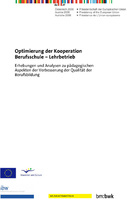Die Berufsschule erfüllt im Rahmen der Lehrlingsausbildung (duale Ausbildung) sowohl ergänzende als auch eigenständige Aufgaben im Interesse der beruflichen und allgemeinen Bildung der Jugendlichen. Hierbei ist sie in ein rechtliches, institutionelles und regionales Gefüge mit den Lehrbetrieben einbezogen: Information und Kontakt sind wesentliche Erfolgsbedingungen. Die Berufsschule ist in das Wirtschaftsgeschehen an ihrem Standort eingebunden. Der direkte Kontakt zu den Lehrbetrieben in der Region ist eine der wesentlichen Vorbedingungen für eine optimale Erfüllung des Bildungsauftrages. Diese normative Bestimmung kann als Ausgangspunkt der vorliegenden empirischen Untersuchung des Verhältnisses von Berufsschulen und Lehrbetrieben in sechs großen Lehrberufen betrachtet werden.
Within the framework of apprenticeship training (the dual IVET system), part-time vocational school fulfils both supplementary and independent tasks in the interest of the young people’s general education and vocational training. In this work, part-time vocational school with the training enterprises forms part of a legal, institutional and regional network: Key prerequisites for success are information and contacts. Part-time vocational schools form an integral part of the economic life of their respective site. Direct contact with the training enterprises in the region is a key prerequisite to ensure they optimally fulfil their educational task. This normative provision may be considered the starting point of the present empirical study of the relationship between part-time vocational schools and training enterprises in six large apprenticeship occupations.
